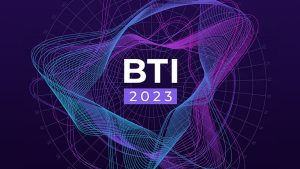
Technology now permeates every sector of our society, with few businesses today surviving without it. Particularly for large organisations, a slick tech stack and IT function is imperative to ensure processes run smoothly, and for retaining a competitive edge.
As a result, our complete approach to digital transformation is changing. Even as recently as ten years ago, a businesses’ IT team would probably have found themselves battling a barrage of scepticism whenever they wanted to implement a digital change, however small.
But consumers now expect technology to be used by companies to better service them. As competition increases and technology proves its worth time and time again, businesses are beginning to drive their own transformation programmes by identifying problems and leaning on tech specialists for solutions.
In tandem with this shift in direction, analysts are also having to adapt and hone their business acumen. After all, how can you deliver the right solution for your client if you don’t understand the problem they’re facing? Whether it’s developing process maps, working on strategy, analysing costs or negotiating contracts, having the right balance between technical and ‘soft’ skills has never been more important for IT analysts. Based on my experience moving from a graduate analyst to Head of Business Analysis at one of the UK’s leading technology and engineering companies, here are the top three most essential skills that analysts today must have:
Listen and engage
If there is one thing I have learnt in my time as a BA (business analyst), it is that poor communication frequently leads to failure.
You could spend two years building and integrating a new system into a client’s existing tech stack. It could be a system that you know full well and have full confidence has the potential to catapult that business into the future. But if that system does not integrate seamlessly with the wider organisation – both practically and culturally – you can guarantee that it will not be used, leading to a huge amount of wasted time and money.
It’s a frustrating but a common situation to be in and it’s also why it’s so important for IT consultants to have good communication skills.
I often see businesses fall into silos as a mistrust toward technology and ‘IT people’ builds a barrier between them and you. In their view, you are there to change the way they work and many people – particularly those that have worked at the business for a long time – will not like that.
So it’s your job to take the lead in building this trusting relationship. That means taking the client on the transformation journey from the very beginning so that they can see and understand the progress and benefits first-hand.
It starts with listening and understanding your client’s goals so that you can design a system and strategy that will meet those goals. But it also means engaging with the internal IT team, 3rd party vendors and the staff that are going to be using the technology you’re building so you can adapt the tech in a way that’s going to work for them long-term.

Speak their language
Communication is a two-way street – once you’ve started listening to your client you also need to encourage them to listen to you.
This might seem simple but you’d be surprised how easy it is to assume someone is on board with what you’re saying when really they’re still trying to process what you told them last week!
But you have to remember that whilst technology might feel second nature to you, for many businesses and its people, the idea of digital transformation and all it encompasses is pretty modern and can appear daunting. Not only that, but to someone very senior, IT is just one part of a very large, complicated business narrative for them, so you need to make yourself heard.
In order to build trust and ensure that everyone is in agreement with every decision being made, it’s therefore vital to keep the client part of the dialogue by using language they understand and reporting in a way that’s accurate, digestible and which demonstrates value at every turn.
Training and upskilling the client’s IT team is an important part of this process and it’s something we at Expleo find very rewarding in delivering long-term value and ensuring a business does not revert to old habits. If you can not only show but teach your client how to better run the systems in their own time, things will run a lot more smoothly.
In my experience, more often than not, the IT team just wants to be heard so bringing them on the transformation journey and giving them a voice within their organisation is key.
Keep your eye on the prize
As I mentioned earlier, one of the biggest shifts we’re seeing in the IT landscape is that businesses are now driving digital transformation programmes by scoping out problem areas that they’d like technology consultants to come and fix.
But to really stay ahead of the game, IT analysts today shouldn’t just be able to resolve the problems presented to them – they need to be proactive and identify problems and solutions before they become an issue in the first place.
Understanding the latest technologies and the way the landscape is evolving is very important. This doesn’t just mean researching the latest technologies but also understanding your clients’ sectors inside out so you can better appreciate how their needs are going to change and advise them accordingly. Think of the bigger picture.
At Expleo, we recently conducted some consumer research into what people want future innovations to focus on so we can better consult our clients on what they need to turn their attention to next. In fact, pre-empting client needs and flagging them well in advance is the hallmark of an excellent business relationship and the sign of a really talented business analyst.
It’s all about honing your research skills, expanding your knowledge and keeping your eye on the prize.
Challenging, but rewarding
IT has the power to bring about transformative change for businesses and there’s nothing more rewarding than completing a project that you know is going to bring about a truly positive change, both for the organisation and its customers. Becoming a business analyst is a hugely fulfilling career, and no matter how tricky it can be at times, you can guarantee you’ll never stop learning, growing, challenging and surprising yourself.
By Shivani Pankhania, Head of Business Analysis and RPA at Expleo, a trusted partner for end-to-end, integrated engineering, quality services and management.





